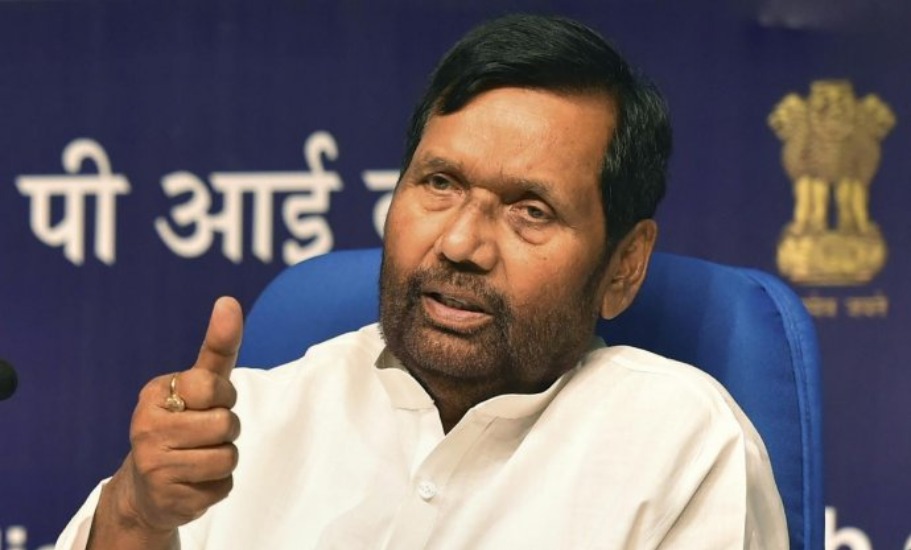
The Paswan factor will play a big role in Bihar elections

On Saturday (October 11) evening when the mortal remains of Dalit leader Ram Vilas Pawan was being consigned to flames at a local cremation centre in Patna, a galaxy of ministers from the state and at the Centre attended the ritual.
One of the notable faces among them was Bihar chief minister Nitish Kumar who stayed at the cremation site for about two hours. This underlines how important Paswan and his Dalit politics have been in Bihar where the Lok Janshakti Party (LJP) founded by him is contesting the Assembly elections against Nitish Kumar’s Janata Dal United (JD-U).
In Bihar, the LJP will be contesting against its allies from the NDA at the Centre. It has fielded candidates in 143 Assembly seats, mostly against the nominees of JD(U), which has got 122 seats under a seat-sharing deal with the BJP. The question is how much this will impact the state poll scene.
Related News: India mourns Bihar’s Dalit icon Paswan; national flag flies at half-mast
Political observers say although the LJP doesn’t have a strong presence in the state, its move is likely to have a big impact on the state politics especially after the demise of Paswan on October 8 following a prolonged illness. According to them, his death has increased the possibility of the Dalits casting sympathy votes this time that could benefit the LJP.
Dusadhs (Paswans), a politically conscious caste to which Paswan belonged, will have a major say in at least five districts — Samstipur, Khagadia, Jamui, Vaishali and Nalanda. Each district has an average six Assembly seats, which means Paswan’s death is likely to have an impact on at least 30 seats.
Also, the LJP enjoys considerable support of the upper caste voters for giving preference to their members in allotting party tickets, being close to the BJP and never annoying them with ugly remarks unlike other politicians.
Although Dusadhs account for roughly about six percent of the total voters in Bihar, they have been polling very aggressively in the state as is evident from the poll percentage of the LJP in the Assembly and Lok Sabha elections since it came into being in 2000. The LJP has polled about seven percent of votes in each election, indicating how it has been the balancing factor in state politics and why every party wants to have an alliance with the party with a strong Dalit base.
The LJP’s best performance was in the February 2005 Assembly polls when it won 29 seats by polling 12.62 per cent votes. However, since neither the NDA or the UPA could form a government in the state, Bihar was brought under President’s Rule.
The LJP now seems to be posing a serious threat to the NDA by fielding candidates in 143 seats, including the 122 constituencies from where the JD-U will contest. Past records show the NDA has fared poorly in any triangular contest in the state. So, if the elections becomes triangular in even 100 seats and the LJP cuts into upper caste votes, then Bihar could have a hung House, political observers said.
Related News: ‘Paswan ka Chirag’ set to light up Bihar poll scene
“Dalits don’t have the strength to win elections on their own and that’s why the LJP always tried to contest polls in an alliance. But this time the situation is different. Nitish Kumar has completed 15 years in power, the LJP is contesting elections against Nitish, and the BJP, too, has realised that time has come to grab power in Bihar,” said political expert Satyanarayan Madan.
According to him, the BJP had supported Nitish in government formation in 2005 with an eye on its own future in Bihar. Now, it thinks that time has come for it to stake a claim on its own. “The time to oust Nitish from power has come and the BJP is working on this strategy. In the changed scenario, the upper caste voters will go to the LJP rather than the JD-U. The upper castes have been voting for Nitish out of compulsion but the moment they realise they have another alternative, they will ditch Nitish who has already lost much of his credibility by switching sides frequently,” Madan explained.
Experts also said the LJP would not have dared to field its candidates against the JD(U) without the tacit support of the BJP. “You can see the connection between the BJP and the LJP. Although the LJP is contesting elections against Nitish, the party has announced it will use the photographs of Prime Minister Narendra Modi in its poll campaign saying a PM belongs to the whole country and not to a particular party. Secondly, Chirag himself has been praising the prime minister. He again expressed his gratitude for cooperation in his father’s cremation and sought Modi’s ‘blessings and affection’ in future, too. This speaks a lot,” said another expert.
Related News: In a first, Lalu Yadav set to miss Bihar poll campaign trail this time
According to experts, LJP’s move may lead to a hung House, which could prompt the BJP to form its own government with the support of other parties. In the worst case, this will pave the way for the imposition of President’s Rule. “Both the options will be beneficial for the BJP,” the expert said.
An indication of how significant the Paswan factor is can be gauged from the fact that even Jitan Ram Manjhi, the former chief minister who has allied his Hindustani Awam Morcha (HAM) with the JD(U), besides several BJP leaders have demanded the Bharat Ratna for the late Dalit leader.

